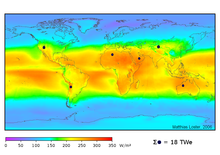Envisioning Our Future/The World We Want in 2075
The World We Want in 2075
[edit | edit source]It was difficult to spot the trends back in 2016, but the weak signals were all there. Energy transformation was underway with the signing of the Paris agreement, Al Gore gave an optimistic TED Talk noting that solar energy had reached grid parity and Time Magazine featured Fusion energy on its cover.[1] The automobile began its

long-needed transformation with the announcement of the Tesla 3 electric car, and the rapid progress of the Google self-driving car. The prominence of Donald Trump and Bernie Sanders as presidential candidates illustrated the anger and deep ideological divides that were frustrating so many Americans who all wanted the best future for their country. Despite remarkable advances in technology, people found it increasingly difficult to earn a living wage. Cracks were already forming in the institutions of capitalism, autocratic world-governments, and even religious beliefs. The Occupy Wall Street movement highlighted the problems caused by economic inequality, and the Black Lives Matter movements highlighted the racial inequality and incidents of police brutality in the United States. Eventually Human rights began to get the attention they deserve, and people began to put well-being ahead of economic growth. We got tired of the mass Media treating us as a bunch of dullards looking for a fight. Eventually we began to practice dialogue and live wisely. The European Union provided a model for international cooperation that allowed massive decreases in military spending. The doors to Cuba began to open in 2016, and when people from Cuba met those from the United States, humanity melded and years of fear mongering and vilification proved to be false. The Department of Peace, advocated by Dennis Kucinich in 2001 was eventually formed with a budget carved out of the massive US defense budget. The global zero campaign was successful in eliminating nuclear weapons. Early experiments with Massively Open On-line courses began a transformation of education systems. Learning eventually displaced teaching and indoctrination as the primary goals of education systems. Well-being displaced economic growth as the primary goal of learning. The importance of the Alaska permanent fund eventually became clear, and it helped to demonstrate how financial systems could be transformed.
Back in 2016 the grand challenges seemed overwhelming and insurmountable, yet great progress has been made and the world is now a better place. Here is a synopsis of how it happened.[2]

The large magnitude of solar energy available makes it a highly appealing source of electricity. In 2015, 30% of all new electricity generation capacity in the United States came from solar. The Tesla Powerwall and other storage solutions allow solar energy collected during sunny conditions to be stored and used at night and other times when the sun is obscured. Environmental concerns, international tensions, and diminishing supply all worked to reduce fossil fuel usage. These concerns along with advancements in solar energy and other renewable energy sources, including nuclear fusion, eventually resulted in a fossil-fuel phase out. The transformation of energy from fossil fuels to renewable sources enabled remarkable transformations in international relations, financial systems, and world governments.
Reduced reliance on fossil fuels began a transformation in the relationship between the Western world and the oil-fueled monarchies of the Middle East. Once the economic dependency on oil was removed, the United States and other democracies became free to address the human rights violations rampant in the Middle East. Arms sales to theocratic nations ceased. Advancement of human rights became the unifying force that allied so many democratic nations to work together to reform the corrupt and oppressive nations of our world. The traditional sports-oriented Olympic Games were augmented with an even more meaningful contest. The goal of this higher-stakes Olympic competition became demonstrating excellence in promoting human rights. Peace continued to break out across the world. Middle East conflicts slowly abated. Nations formed larger cooperative alliances to accelerate advances in well-being across broad regions. Peace-loving forces eventually infiltrated North Korea. International laws became more effective in helping nations work together peacefully, fairly, and productively.
Religious extremists of every ilk tested the limits of cultural relativism. The golden rule was wisely applied in response and the principle that “your freedom ends where mine begins”[3] was used to resolve the conflicts and establish the limits of tolerance. It became understood that cultural relativism is bounded by human rights, and human rights remain well defined by the Universal declaration of Human rights.

Two powerful and divergent trends in education were eventually resolved. The cost of higher education increased until it became unaffordable for most people. However, at the same time the growth of massive open online courses made learning resources freely available. The result is that now many educational needs are met for free, while students still pay for specialized education, advanced education, and certifications recognizing their achievement of specific learning objectives. Literacy has run rampant, curiosity and creativity were unleashed, and people are using education to live wisely rather than to become slavishly trapped pursuing economic growth. Increased literacy world-wide empowered many people to see possibilities beyond the propaganda and tyranny of authoritarian governments and theocracies. People began to focus on what matters.
Modernized beliefs also helped to transform relationships with the Middle Eastern people. With the 2004 publication of his book The End of Faith, Sam Harris became the first of the new atheists to persuade large audiences to scrutinize religious belief of all faiths. In 2009 the charter for compassion, urged the peoples and religions of the world to embrace the core value of compassion. The 2015 film Spotlight highlighted the abuses and systematic cover-ups of the Catholic Church and helped people see the very real fallibility of that institution. The trend caught on, and as early as 2016 approximately 23% of Americans identified themselves as nonreligious.[4] The key to the transformation was the recognition that faith is an unreliable epistemology. Rather than working to convince people that your myths were better than their myths, thoughtful people began dismissing the religious mythology altogether. People began to think beyond theism and seek real good.
The trend toward secularism took hold in Scandinavia, spread to other countries with open democracies, and eventually began to slowly penetrate even the insular Islamic cultures. Information wants to be free, and the spread of information through Internet connections, mobile phone use, international travel, global commerce, and cultural exchange eventually eroded the autocratic structures trying to control populations by imposing massive censorship. The deep divisions that religion sustained for so long began to heal as people united under secular concepts of ethics and culture. As people eventually recognized that contraception prevents abortion, hypocrisy slowly abated from the abortion debates, and governments eventually left this difficult decision up to each woman.

The bestselling book Capital in the Twenty-first century helped people understand and examine several flaws in capitalism. The central thesis of the book is that economic inequality is not an accident, but rather a feature of capitalism, and can only be reversed through state interventionism. The book argues that, unless capitalism is reformed, the very democratic order will be threatened. As a result of this influential book and the Occupy Wall Street movement, people began to rethink money. Study of the Alaska Permanent Fund, the Government Pension Fund of Norway, books such as Sacred Economics by Charles Eisenstein and work on steady-state economy by Herman Daly demonstrated the possibilities.
The key transformative concept was to assign an economic value to use of the public commons and return this revenue as a citizen’s dividend. This ancient idea gained modern importance as the gross distortions of income inequality became unacceptable. Local, state, national, and eventually regional governments began to charge for extraction or depletion of mineral resources, fresh water, wetlands, fishing grounds, and dumping of waste onto land, into water, and especially into the atmosphere as greenhouse gas emissions. This expansion of market mechanisms to include the most valuable resources on earth had powerful benefits. Because we began to tax what we want less of, the transformation away from fossil fuels accelerated. Air and water became cleaner, and the ocean fisheries began to replenish to sustainable levels. Equally important, the citizen’s dividend funded by these fees grew to approach a living wage for all adult citizens. Because people could now choose to work rather than be forced to work to survive, the workplace was transformed. Robots worked so that people could live. The threat of unemployment no longer spread fear. Minimum wage laws became obsolete as the citizen’s dividend naturally created a floor for all wages. People were able to focus on what matters, as they were freed from the enslavement of economic growth.
With religious taboos removed, the imperative for economic growth gone, and advances in birth control methods and cultural norms, populations began to decline worldwide. Because the earth’s resources were shared among fewer people each of us became richer.

Renewable energy, reduced population, environmental awareness, and programs such as rewilding allowed the earth to regain much of its verdant beauty and increased the biodiversity.
Research on in vitro meat production eventually allowed tasty and nutritious meat to be produced without the sacrifice of living animals. This made factory farms obsolete and advanced animal rights. People enjoyed eating healthier foods without guilt, and with lower environmental impact.
People began to practice dialogue, and even our political discourse was elevated. Long ago Thomas Jefferson told us that “An enlightened citizenry is indispensable for the proper functioning of a republic.” Concerned citizens created a knowledge base modeled after Wikipedia dedicated to the political issues of the day. In this knowledge base each issue is described in detailed, factual, and ideologically neutral terms. Potential effects on well-being are explored from a long term global perspective. A wide variety of approaches to resolving the issues are presented, and the positions advocated by various politicians are described. Socratic methods regained popularity and the goal of debate eventually shifted from winning to gaining insight. Clear thinking began to prevail. Falsehoods and fallacies were no longer tolerated. We got a better grasp on what ought to be. Wiser citizens became more involved in electing wiser officials.
It has been more than one hundred years since John Lennon told us that “All You Need Is Love” and challenged us to “Imagine” a better world. Only now have we cleared away enough clutter to be able to understand those profound truths. It has been a long and winding road, but the world of 2075 is better as a result of the turmoil of 2016. We now are making remarkable progress toward that elusive goal of peace on earth and good will toward all.
Notes
[edit | edit source]- ↑ Inside the Quest for Fusion, Clean Energy’s Holy Grail, Time Magazine, Nov 2, 2015, Vol 186 No 18
- ↑ It is interesting and instructive to notice that the majority of the transformations described here are accomplished through revisions of existing social constructs. For example: financial systems, governments, legal systems, military organizations, international relations, religious traditions, cultural norms, and other systems are sets of rules, symbols, beliefs, and traditions that were created by humans, accepted by humans, and shape the daily lives of humans. These social constructs can be examined, debugged, and improved to create a better future. This is sociology, not physics.
- ↑ This phrase is adapted from the original “Your right to swing your arms ends just where the other man’s nose begins.” Cited at: http://quoteinvestigator.com/2011/10/15/liberty-fist-nose/
- ↑ Meet the ‘Nones,’ the Democratic Party’s biggest faith constituency, February 29, 2016, The Washington Post.
